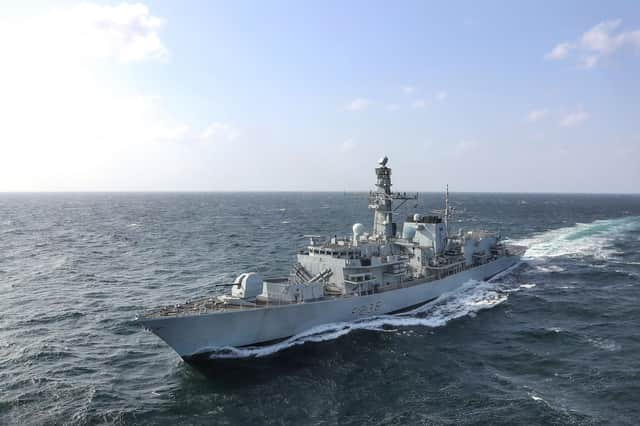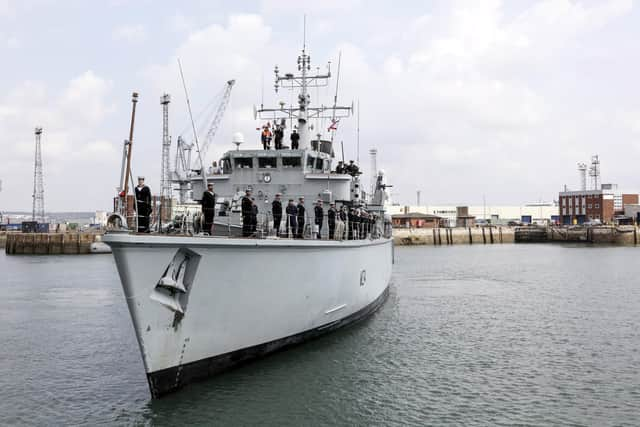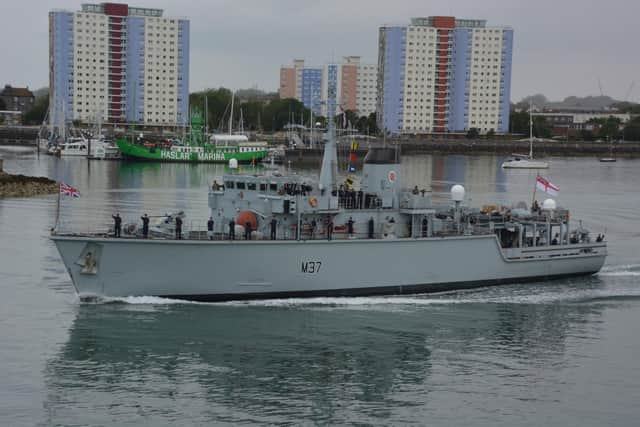Royal Navy could lose two of its frigates in multi-billion pound defence shake-up


The long-awaited integrated review is set to be unveiled officially by prime minister Boris Johnson later this afternoon.
However, a leaked 100-page document claims that Type 23 frigates HMS Montrose – which had been earmarked to join Portsmouth’s flotilla after its current mission in the Gulf – is set to be axed alongside sister ship HMS Monmouth, The Sun claims.
Advertisement
Hide AdAdvertisement
Hide AdThe paper also reports that the navy’s ageing fleet of minehunters, most of which are based in Portsmouth, are to be cut and instead replaced by state-of-the-art drone vessels, which can be deployed from other warships.


Meanwhile, the army is expected to bear the brunt of the cuts, with some 10,000 troops and four infantry battalions in the firing line.
Among the units potentially at risk of reduced include Portsmouth’s local infantry regiment the Princess of Wales’s Royal Regiment, which is made up of four battalions – two regular units and two part-time reservist battalions.
Downing Street has yet to confirm the details contained within the document, with foreign secretary Dominic Raab this morning telling BBC Breakfast he could not ‘break the embargo’ of the defence review.


Advertisement
Hide AdAdvertisement
Hide AdOther details expected to be announced include an increase of Britain’s stockpile of Trident nuclear warheads ending three decades of gradual disarmament.
The government’s Integrated Review of security, defence, development and foreign policy will increase limit from 180 to 260 warheads, according to the Guardian.
The paper said that it paves the way for a £10bn rearmament in response to perceived threats from Russia and China.
Elsewhere the review is said to warn there is a ‘realistic possibility’ that a terrorist group will launch a successful chemical, biological, radiological or nuclear (CBRN) attack by 2030.
Advertisement
Hide AdAdvertisement
Hide AdPrime minister Boris Johnson will set out the findings of the year-long survey – billed as the most radical reassessment of Britain’s place in the world since the end of the Cold War – in the Commons later today.
It is expected to include the creation of a new state-of-the-art counter-terrorism operations centre to streamline the response of police and the intelligence agencies in the event of an attack.
The will also be a new ‘situation centre’ in the Cabinet Office similar to the White House situation room where Barack Obama was able to watch the US special forces operation to kill Osama bin Laden in real time.
The review document – entitled Global Britain in a Competitive Age – argues the increase in nuclear warheads cap is ‘in recognition of the evolving security environment’ and the ‘developing range of technological and doctrinal threats’, the Guardian said.
Advertisement
Hide AdAdvertisement
Hide Ad‘A minimum, credible, independent nuclear deterrent, assigned to the defence of Nato, remains essential in order to guarantee our security and that of our allies,’ the review says.
The review states that Russia under Vladimir Putin represents an “active threat” however the language on China is more measured, saying Beijing poses a “systemic challenge”.
According to The Times, which has also obtained a leaked copy of the review, it says the UK will ‘not hesitate’ to defend its values and will increase the protection of critical infrastructure, such as the national grid, transport and water supplies.
The UK will also take a strategic ‘tilt’ towards the Indo-Pacific region, reflecting the view of ministers that it is increasingly becoming the ‘geopolitical centre of the world’.
Advertisement
Hide AdAdvertisement
Hide AdThe shift will be underlined by the deployment of the HMS Queen Elizabeth carrier strike group to the region on its maiden operational mission later this year.
Looking for the latest Royal Navy updates from Portsmouth? Join our new Royal Navy news Facebook group to keep up to date.
A message from the Editor, Mark Waldron
The News is more reliant than ever on you taking out a digital subscription to support our journalism.
You can subscribe here for unlimited access to Portsmouth news online - as well as our new Puzzles section.
Comment Guidelines
National World encourages reader discussion on our stories. User feedback, insights and back-and-forth exchanges add a rich layer of context to reporting. Please review our Community Guidelines before commenting.